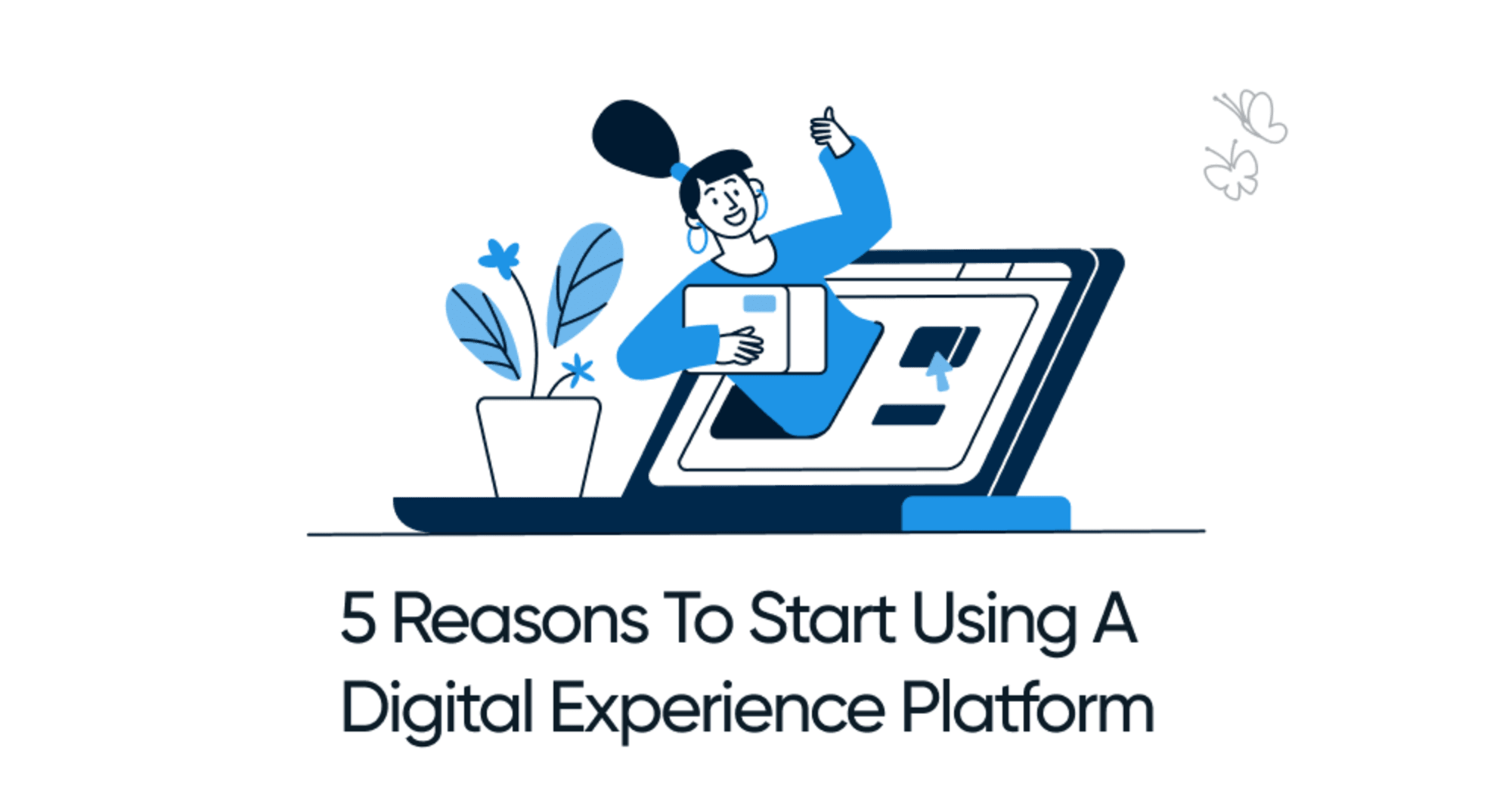5 Reasons To Start Using A Digital Experience Platform (DXP)


Digital Experience Platforms (DXPs) are becoming incredibly popular, and rightly so.
Digital Transformation has become a hot topic across all digital-based businesses and even for those without a digital presence, since the hit of COVID-19. Everyone is working to improve their digital channel, finding ways to deliver a more efficient and effective Digital Experience to their audiences.
With the focus now on “digital” more than ever, newer more advanced platforms for managing content and data have become increasingly popular and essential to consider.
One of the newer platform types emerging is the Digital Experience Platform.
What Exactly Is A Digital Experience Platform?
A Digital Experience Platform can be thought of as a central hub for all the technologies you need to deliver a rounded digital experience. Typically a single product, a DXP can include a number of more traditional technologies such as a CMS, CRM, eCommerce, Modules, Custom Databases, Blog, Unique Logins, Developer Tools and more.
A DXP then, can form a single integrated and seamless product from which you can create and maintain a smooth Digital Experience without needing to bolt together various external solutions.
More than this though, a DXP also typically provides a fully equipped API enabling connectivity to any third party solutions on top.
Digital Experience Platform Use Cases
With a platform type that is so powerful, flexible, and easy to scale with, what can you use it for?
The most popular use cases are:
- Digital Experiences
- eCommerce Stores
- Customer Portals
- Marketplaces
- Membership Sites
- Bespoke Applications
Do you want to learn more about DXPs, and how they compare to older existing platform types such as Headless CMS and Hybrid CMS? Find out more about Digital Experience Platforms here
_____________________________________________
5 reasons To Start Using A DXP
1. Save Everyone Time
DXPs put all of the various technologies in one place, so they can all connect to each other easily, right out of the box.
What about visitors?
Often when building on a CMS, you may need to send visitors to different subdomains or a different site entirely for them to be able to purchase items from your eCommerce store. They may be more likely to leave than to complete their purchase as they could get lost in the transition and the time taken to find what they're looking for.
How Can A DXP Save Everyone Time?
- Using outdated technology such as a traditional CMS, you’d need to spend time researching and scoping which tools and platforms can talk to each other; with a DXP, everything and everyone can be in the same place.
- With everyone in the same tool, you can view and manage all of your data in the same place - no time wasted switching or connecting tools, only needing to be familiar with one platform rather than multiple, or bolting this data together across platforms. Keep it seamless.
- With everyone working and collaborating in the same tool that can match the requirements of each team, you also usually experience a faster time to market
- No more getting stuck halfway with an integration due to API and data limitations
- No more having to spend longer finding a new product that can fit into your existing mesh of tools and products
- Visitors can enjoy a consistent experience and transition to customers easily, without much mental effort to find what they're looking for and make their purchases
2. Full Data Control
Arguably the most important aspects of building effective digital experiences is data: form cases; CRM; blog items; content; services and more.
Without this core data in place, your website becomes nothing more than a simple brochure site.
When there’s data, you need control.
A common occurrence with CMS' is that data can be 'locked in'. This data is either not accessible from 3rd party tools at all, or is locked behind additional paywalls to get a clunky rigid way of connecting.
With DXPs, right from the get-go, data within the platform is infinitely connectable and usable with all the various tools the DXP provides.
What about if you prefer to send this data to another tool or work with other companies or clients outside of the website for their ease?
Let's say it again for those in the back - you have complete control.
Many DXPs also provide a capable API which means you have full control to send, connect and receive data from any 3rd party tools you would like to add and use alongside your chosen DXP platform.
You have complete control over your data by using the powerful manual import and export tools in place and/or working with public APIs in place.
3. Customer Personalization
In the era of Netflix and Amazon, recommendations providing users with an experience tailored specifically to them has become king.
Being able to dynamically define content shown to your customers based on their needs is now essential.
DXPs, unlike traditional CMS platforms, are built to enable you to do just this. The very design of a DXP gives you full accessibility and flexibility to deliver a user-driven experience.
Marketers can achieve more user-centric digital experiences by beginning to implement artificial intelligence (AI) within their chosen DXP to enable their websites to behave more intuitively when customers interact across more digital touchpoints.
Digital marketers can set up effective automations to allow for easier personalization, creating the perfect unique customer experience and funnel.
Thanks to the flexibility of a DXP, this same data can be used dynamically in your sales and marketing as well. Making your team's digital content work harder for you without using up more time or money!
4. Security At The Core
Traditional CMSs are often built on ageing or outdated technology stacks, which at their core are not as secure. When using a traditional CMS, you also often need to add countless plugins just to achieve some basic functionality needed to deliver sites.
While working with plugins provides a wide range of benefits and enhancements that can lift a site beyond the core limitations of a more basic CMS (eCommerce functionalities, forms, themes, and more); poorly built plugins can introduce vulnerabilities to your site and even inject malicious code that damages the data and content you already have, without you even being aware! Poorly maintained modules that are not regularly updated can also introduce large security risks.
Digital Experience Platforms differ hugely from a traditional CMS in terms of security.
Most DXPs provide tools and features that enable users to create their desired functionality without sacrificing their site’s security, or risking introducing third-party plugins with malicious code.
Despite the flexible nature of DXPs, you have full control over moving data around your sites and connecting to other tools, while using best practices in security and protecting your content.
5. Easy To Scale
The best part about using a DXP is that when your sites grow and now need extra functionality, you only pay for how much storage you use and not each individual features.
No limited functionality. No features behind paywalls. Build what you like the way you like to, and scale any site with complete ease.
Even if you do not need all of the provided functionality now, when you do, there’s no need to hunt around for a third party option that could work with your current platform. Simply turn it on and set up the built-in options - easy.
As with many other services we are all used to nowadays, DXPs tend to run on usage-based pricing as well.
This means you can start small, only pay for what you need and use. As a site grows, you can scale up the plans seamlessly to match. All without needing to do anything extra or move platforms to accommodate.
Bonus - 6. Cost
Digital Experience Platforms can often be the most expensive upfront, however, are the cheapest overall!
Why are Digital Experience Platforms (DXP) expensive upfront?
Platforms like these can revolutionise how you work, how you collaborate with your colleagues and how you build websites. So DXPs typically have high entry license fees before you can even begin using the platform.
But..
With no need to build and maintain your own tech stack, and little to no maintenance needed by your team; and no need to source, purchase and integrate all of the third party solutions yourself: you can end up saving so much money and time.
When looking at the separate subscription costs of all of the third party solutions you’ve integrated (to meet the same functionality as a DXP), can add up to be more expensive than just using a DXP.
What are you going to use your saved time and money on?
_____________________________________________
What about Siteglide?
Most DXPs are positioned at enterprise level and so have significantly higher costs than SME / entry-level needs of smaller businesses, placing all their benefits firmly out of reach.
Siteglide however, delivers enterprise-level reliability, security, flexibility and technologies at a lower entry price point.
With no bulk one-off entry fees, you can simply use usage-based pricing to get started.
Usage-based pricing on a per-site level means you can start small to match the size and usage of a business now, then seamlessly scale as needed later.
Siteglide is actually the most affordable digital experience platform on the market without sacrificing the core technologies one bit, so you get everything you would if you were to pay those enterprise prices elsewhere!
Experience an enterprise-grade platform without the enterprise pricing!
Start your Digital Experience Platform journey today by signing up (for free!) and taking a look around Siteglide.



